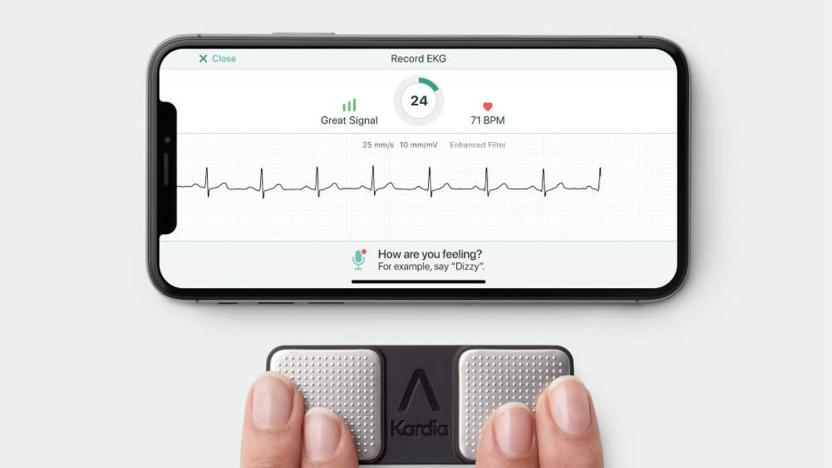alivecor
Latest

FDA clears first personal ECG device to detect three heart arrhythmias
To date, personal ECG devices have only really detected one kind of heart arrhythmia: atrial fibrillation. While that's helpful, it doesn't cover other conditions that could be just as dangerous. You might not be left wondering for much longer. AliveCor's KardiaMobile has received the first FDA clearance allowing a personal device to detect two other relatively common conditions, bradycardia (where your heart rate dips to 40-50BPM) and tachycardia (a jump to 100-140BPM). While these conditions are sometimes innocuous and might not show symptoms, they can also be representative of issues like heart disease.

AI identifies 'invisible' heart condition LQTS
AI is playing an increasing role in medical care, from spotting diabetes and examining medical scans, to taking the place of doctors altogether. Now, it's able to recognize life-threatening conditions where traditional diagnostic tools can't. AliveCor, the company behind KardiaBand, has harnessed machine learning to identify patients with Long QT Syndrome (LQTS), a condition that frequently goes undetected.

AliveCor wearables may detect unsafe potassium levels in the future
AliveCor is working on a new application for the technology behind its KardiaBand for Apple Watch. Last year, the FDA approved KardiaBand as a medical device, and it can record your heart rhythm and report on any rhythmic abnormalities that could be linked to dangerous health issues. Now, The Verge reports, AliveCor is developing a way for its technology to be used to detect high levels of potassium in the blood.

FDA clears first EKG band for the Apple Watch
AliveCor's KardiaBand, a device that detect dangerous heart rhythms, has become the first Apple Watch accessory cleared for medical use by the FDA, the company announced. It can capture your EKG in 30 seconds, then detect problems like atrial fibrillation, a type of heart arrhythmia.

Your next Apple Watch band could warn you of a stroke
Sure, you've been rocking that metal link band for your Apple Watch since you got it, and it's fine for fashion and all, but what about its function? There's no way it could measure your heart's electrical activity. That's where the AliveCor's medical-grade Kardia band fits in. AliveCor claims the band is the first of its kind and, considering the company's heritage, the strap seems like a natural progression from its electrocardiogram phone cases.

Your smartphone can now tell you if you have a heart condition
How's the ticker? Some dangerous heart problems can exist without any symptoms whatsoever, like "atrial fibrillation" (A-fib) a type of abnormal cardiac rhythm that affects one in four people. A visit to your physician is normally required to detect it (and is still a must), but a company called AliveCor has just announced that its AFib Dector algorithms have been approved by the FDA for professional or personal use. It consists of the company's $199 heart monitor (also available in an integrated iPhone 5/5s case, shown above) which attaches to an Android or iOS smartphone and rests on your fingers or chest to record your electrocardiogram (ECG). It then sends the info to your smartphone via an ultrasonic signal which is picked up by your phone's microphone, requiring much less power than a Bluetooth system.

AliveCor ECG comes to Android, transmits your palpitations to Instagram
If you've been gazing longingly at the AliveCor Heart Monitor but an Android affinity has kept you out in the cold, its developer has good news. Starting today, AliveCor's clinical-quality (and now FDA-approved) ECG is compatible with the Samsung Galaxy S III, S4 and the HTC One. The device itself is available as a standalone accessory, but users of select handsets can pick up a case with it built in. What's more, the unit is on sale today for $199 through the developer's website, in case you need to keep an eye on your ticker at all times. If your heart really does beat faster when you hold your loved ones, you can now share that on Instagram too; the University of Southern California has created BioGram, an app that pairs with AliveCor's tech to do slap your heart's BPM over the top of your sepia-tinged photos. Awww.

Daily Update for November 7, 2012
It's the TUAW Daily Update, your source for Apple news in a convenient audio format. You'll get all the top Apple stories of the day in three to five minutes for a quick review of what's happening in the Apple world. You can listen to today's Apple stories by clicking the inline player (requires Flash) or the non-Flash link below. To subscribe to the podcast for daily listening through iTunes, click here. No Flash? Click here to listen. Subscribe via RSS

AliveCor iPhone app and case promise a portable ECG
It's not available for purchase yet, but AliveCor's iPhone case and app could make a trip to a cardiac specialist for an ECG a thing of the past. The case, which is currently designed for the iPhone 4/4S, is a portable electrocardiogram (ECG). An ECG measures the electrical activity of the heart, usually with a trained cardiologist making the call on finding abnormalities that could be the sign of heart disease. The AliveCor case contains two sensors that are placed on the patients chest, after which the device takes a 30-second reading and uploads the acquired data to secure cloud storage. Once the information is available, a medical professional can access and analyze it. Since people at risk of cardiac disease could essentially self-administer an ECG at any time, AliveCor's product could provide an inexpensive way to do initial screenings and monitoring of heart conditions. Remote monitoring could be done with the device in the future, alerting a patient to take another reading or visit a doctor automatically. At this time, the AliveCor ECG is only available in a US$199 version intended for use on dogs by veterinarians. It has, though, been useful to at least one person -- Scripps cardiologist Dr. Eric Topol used a sample for-human device to examine a passenger who was complaining of chest pain on a flight. The device showed that the passenger was having a heart attack, and the plane made an unscheduled landing so that the person could receive emergency treatment. [via Wired]

iCard ECG brings heart monitoring to the iOS device of your choice (video)
AliveCor's iPhoneECG case was pretty sweet but, being a case, could only be strapped to an iPhone 4. Doctors content with their 3GS or patients who prefer to hug an iPad to their chest will be elated to hear the company is working on a more hardware-agnostic option for your iOS heart monitoring needs. The business card-sized iCard ECG mounts to the back of your iDevice using velcro and wirelessly feeds data from its electrodes to the AliveECG app. The app automatically records 30 seconds of your heart's rhythmic pulse before uploading it to AliveCor's servers for sharing with your doctors. The bad news? They're still awaiting FDA approval, so you can't run out and pick one up just yet. But, when it does hit shelves, it looks like you'll have a choice of red or black -- so you can make sure your medical accessories match your scrubs. Check out the video after the break.

iPhonECG case monitors your heart rate to make sure you're appropriately excited about CES
CES isn't just about incrementally thinner or faster hardware, you know. Some people like to bring legitimately innovative ideas to the show, such as this iPhonECG case, which does what its name suggests: it takes an ECG (electrocardiogram) reading of your heart's activity through a pair of electrodes and then communicates its findings to an iPhone 4 it can be attached to. We say it can be attached to an iPhone as communication is done wirelessly, so you'll probably be able to monitor your ticker's rhythm without the Applephone pressed against your bosom. Then again, maybe you like that. It's a free world, we don't judge. We'll be sending out our most hairy-chested editor to give this thing a proper test at the Las Vegas convention next week. Until then, scope out the video after the break.






